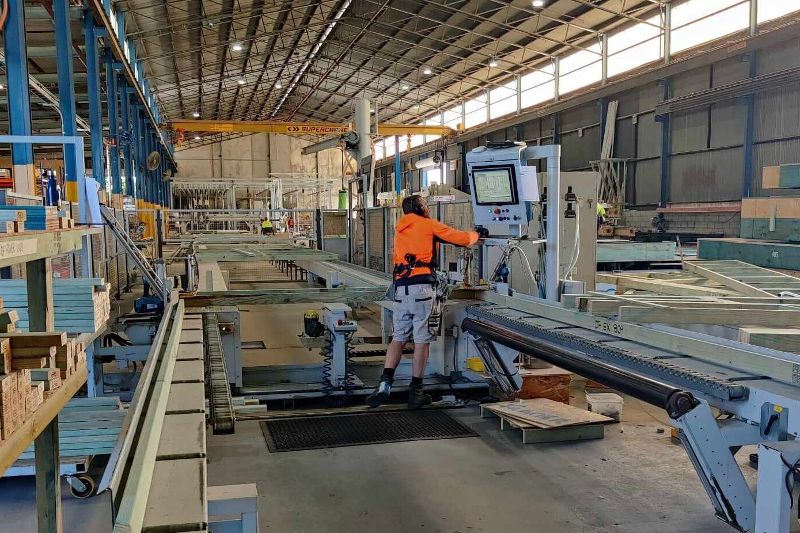

Bankwest Curtin Economics Centre report: “The government should pilot new contracting approaches for public projects and invest in offsite and modular construction”.
A recent report by the Bankwest Curtin Economics Centre highlights the urgent need for transformation within Western Australia’s construction sector. The ‘Building the Dream: The Future of Western Australia’s Construction Industry’ report warns that without significant changes, the state will fall short of the National Accord target of 25,000 new dwelling units per year—a figure that merely keeps pace with projected population growth. (main pic: Perth-based OFFSITE’s panelised timber design-to-construction process in action.)

Addressing Workforce Shortages and
Boosting Housing Supply
The report, co-authored by Professor Alan Duncan, Director of the Bankwest Curtin Economics Centre, identifies critical challenges facing the industry. These include a severe shortage of skilled workers, fluctuating dwelling approvals, and high material costs. Professor Duncan emphasises the need for targeted solutions to these issues, stating, “Resources should be directed towards trades in highest demand and the Construction Training Fund program should be expanded to prioritise these areas.”
To address the workforce shortage, the report suggests accelerating the qualification process for overseas workers and providing hiring subsidies for new apprenticeships. “Retaining skilled workers and new trainees is especially challenging for WA’s building and construction industry given the lure of other industry sectors,” Duncan added. “Relocation and apprenticeship packages need to be designed to incentivise retention and prevent skills leakage.”
Utilising Vacant Housing Capacity
A notable finding from the report is the significant number of vacant bedrooms across the state. If every spare bedroom were utilised, it would amount to 1.45 million bedrooms across WA, with 675,000 remaining as vacant capacity even after optimal usage. “The extraordinary rate of vacant housing capacity points to two major issues in Western Australian housing,” Professor Duncan noted. “Firstly, we are failing to use our current housing stock efficiently, and secondly, the diversity of housing stock remains inadequate.”
Improving the diversity of available housing options and reducing transaction costs from stamp duty are recommended to encourage ‘rightsizing’ among homeowners, which would release vacant housing capacity and improve efficiency.
Emphasising Offsite and Modular Construction
The report underscores the potential benefits of offsite and modular construction methods in addressing housing shortages and improving sustainability. “Contracting practices need improvement to protect both consumers and builders,” Duncan said. “The government should pilot new contracting approaches for public projects and invest in offsite and modular construction to diversify housing options.”
Promoting Sustainable Practices for Net Zero Goals
Dr Adam Crowe from the Curtin-AHURI Research Centre at Curtin University highlights the construction sector’s vital role in WA’s net zero transition. “The environmental performance of WA’s construction industry over time has seen a steady and consistent decline in aggregate carbon emissions since 2007,” Dr Crowe stated. The report calls for the government to encourage investment in low and zero-carbon building processes such as offsite and modular construction, and incentivise the use of recycled materials.
Strengthening Local Procurement and Supply Chains
The report also suggests strengthening local procurement and supply chains to help local businesses compete for contracts. “The government should lead by example, setting high environmental standards for its buildings and procurement processes,” Dr Crowe added.
Setting Clear Standards and Incentives
To support these initiatives, the report recommends clear energy efficiency standards and mandatory energy performance disclosures for new developments. It also advocates for flexible carbon market mechanisms that focus on actual emissions reductions rather than shifting high-carbon production elsewhere. “The delivery of sustainable housing by the construction sector can have a significant continued influence on carbon emissions reductions,” Dr Crowe concluded.
The report’s findings highlight the critical need for transformation within WA’s construction industry to meet housing demands and achieve net zero targets. By addressing workforce shortages, utilising vacant housing capacity, and promoting sustainable practices, the sector can significantly contribute to the state’s economic, social, and environmental progress.
Download the (pdf) report HERE